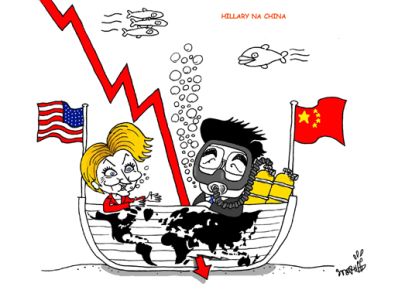
'HILLARY IN CHINA'
[Hoje Macau, Macau]
Financial Times Deutschland, Germany
Crisis in the Markets: More Imagined than Real?
"Recent findings in the field
of cognitive psychology show us that most of our basic decisions are drawn from
irrational thinking. We're often tempted more by emotion than we would like to admit.
The fact that we don't want to admit this is a problem. Let's face it - who's happy
to admit to being guided by irrationality?"
By Nicholas Adjourim, managing director of Adjouri Brand
Consultants
Translated By Ulf Behncke
February 21, 2009
Germany - Financial Times Deutschland -
Original Article (German)
The financial players and
the U.S. government have underestimated the role played by a dangerous
accelerant in this crisis: psychology. When fear becomes a mass-phenomenon, all
of us hold our collective breath.
Imagine that you wake up
tomorrow and the financial crisis is no more. Everything we've heard or read in
recent months about panic on the financial markets, bankruptcies, production
stoppages, mass layoffs and rescue packages would be gone, finished, wiped out -
just as though none of it had happened. While this may sound utopian or irrational,
the idea isn't so absurd. Indeed, the concept could be summed up in a single
question: What if the financial crisis isn't real, but merely a self-fulfilling
prophecy?
What may sound like an
exaggerated, unrealistic postulation has a very real basis. After all, the
downward spiral in which we find ourselves is to a great extent based on our own
attitudes - attitudes that aren't always the kind we like and which are largely
irrational.
Back to the facts: Of course,
we're now experiencing a severe crisis on international financial markets. It's
also clear that the current distortions within
financial markets and the real economy are on a par with the global economic
crisis of the 1930's. At least since the Nobel Prize
in Economics was awarded to Daniel Kahnmeman for
his work on Behavioral Economics, we have known that all human beings -
particularly financial professionals - make decisions not on a rational basis,
but on irrational principles. Prior to this, the popular wisdom was that decisions
were made based on use-oriented facts, the symbol of which was the so-called Homo Economicus, i.e.:
the rational man who weighs the pros and cons and then decides on supposedly
correct decisions in order to maximize profits.
This is the theory which dominated
over recent decades and only slowly, but rightly so, is being supplanted.
Because the opposite is true: Recent findings in the field of cognitive
psychology show us that most of our basic decisions are drawn from irrational thinking.
We're often tempted more by emotion than we would like to admit.
FIGURES AS A FEEL-GOOD CORSET
The fact that we don't
want to admit this is a problem. Let's face it - who's happy to admit to being guided
by irrationality? The financial sector in particular finds this difficult
to accept. The world of finance is full of analysis, charts, graphs, data and
PowerPoint presentations, designed to illustrate that only pure rationality in
the form of numbers and formulas are what counts.
Such financial mathematics makes
us feel safe. But particularly during the current crisis, it has become increasingly
apparent that these sets of figures work only as a feel-good psychological corset.
The consequence is that when confronted by the horrific news about bank
nationalizations, corporate failures and the crash of the economy, we allow
ourselves to be infected by a general panic.
DESTROYED CONFIDENCE
This fear isn't individually
identifiable. It is rather a mass phenomenon in which we hold our collective
breath, along with which comes a huge loss of confidence, which in turn
contributes to a market collapse.
How can confidence be
restored? Or to ask this in a different way: what will the price of confidence
be? Anyone who has ever been badly disappointed knows how long it takes to
rebuild that trust. The financial markets are no different, because collectively,
we are unforgiving. This has been even more true since the collapse in
September of U.S. investment bank Lehman Brothers,
which in retrospect Finance Minister Peer Steinbrück
called a “watershed event” in this crisis.
Lehman Brothers was founded in 1850 and was considered a bedrock of
the industry: it was a brand that not only had a solid credit rating, but
something of even greater importance: an immeasurable amount of trust. No one,
not even the most connected insider, could or would have imagined that this
player might one day disappear from the markets.
Posted by WORLDMEETS.US
But the financial
world is now so unwieldy that even the key players no longer understand their
own rules. On top of that, they tend to underestimate the factor of psychology in
very dangerous ways. Indeed, amidst the great uncertainty on the markets, the
common man is searching for constants and security. In the economy, particularly
in the financial sector, it is major brands which are playing this role.
With Lehman Brothers, one of
those constants disappeared. Whatever led the U.S. government not to save the
investment bank, unlike its rivals Bear Stearns and the insurance group AIG - the
fact is that with the collapse of Lehman, a bank that really was too big to
fail - a massive amount of confidence was destroyed and irretrievably lost.
CLICK HERE FOR GERMAN VERSION
[Posted by
WORLDMEETS.US February 24, 6:52pm]